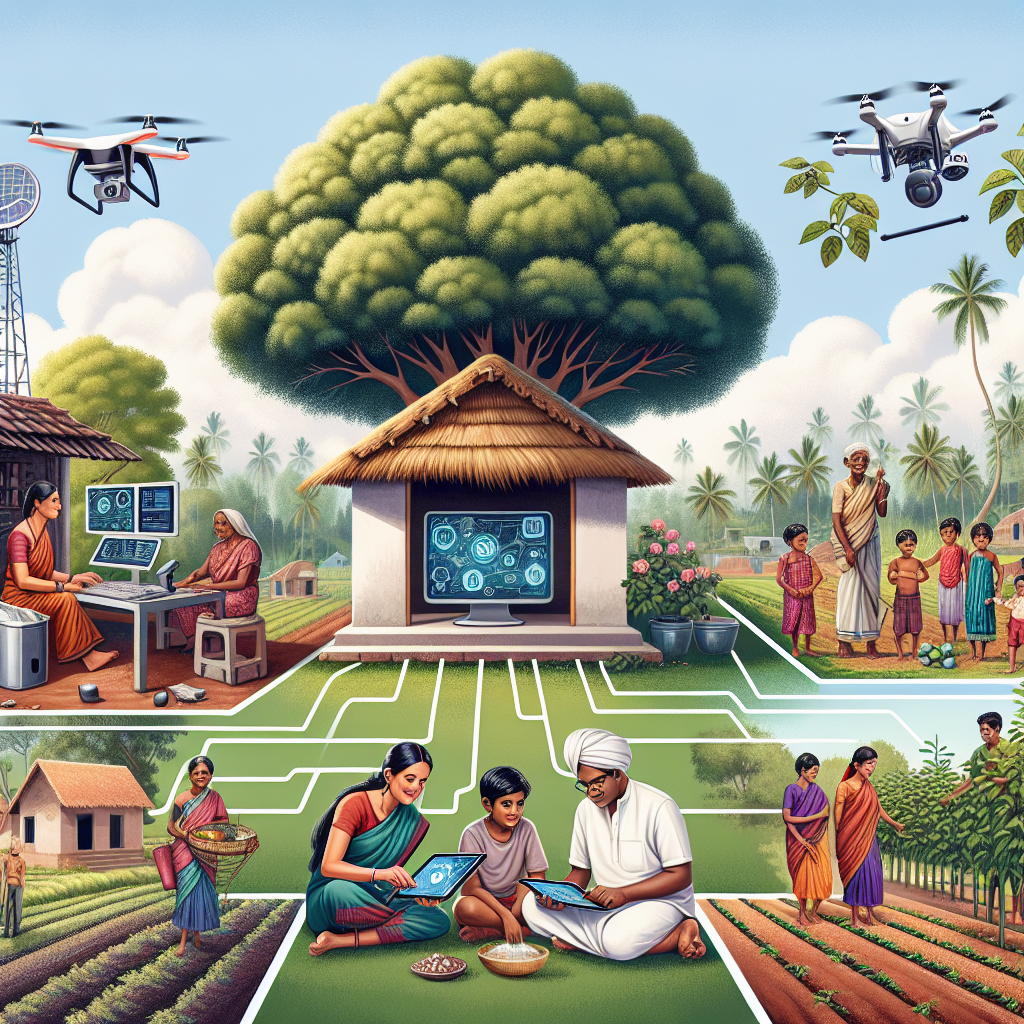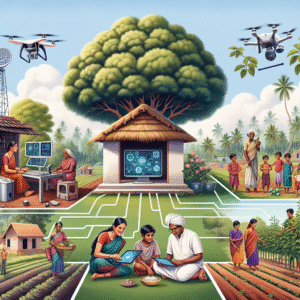The Transformative Impact of Artificial Intelligence Tools on Indian Villages
Estimated reading time: 7 minutes
- AI tools enhance agricultural productivity and healthcare access.
- Precision agriculture can improve crop yields significantly.
- Digital inclusion is facilitated by diverse data from rural communities.
- Several challenges, including digital literacy and infrastructure, persist.
- Adaptation is crucial for businesses and HR professionals in this evolving landscape.
Table of Contents
- Introduction
- Key Impacts of AI in Indian Villages
- Healthcare Access
- Digital Inclusion and Socio-Economic Development
- Broader Trends and Outlook
- Challenges and Ongoing Needs
- Practical Takeaways for Recruiters and HR Professionals
- Conclusion
- FAQ
Introduction
The advent of Artificial Intelligence (AI) tools is reshaping many facets of life across the globe, and nowhere is this transformation more evident than in the villages of India. As we delve into the impact of artificial intelligence tools on Indian villages, we uncover a remarkable narrative of how AI is enhancing agriculture, healthcare, digital literacy, and pushing for broader economic inclusion.
In this blog post, we’ll explore specific areas where AI is making strides, the challenges that accompany these advancements, and how these developments can inform AI consulting practices and workflow automation initiatives, particularly for businesses operating in or interacting with rural communities.
Key Impacts of AI in Indian Villages
Precision Agriculture
One of the most significant impacts of AI tools in Indian villages is their role in transforming agricultural practices. With the application of precision farming, AI-powered technologies are improving crop yields by as much as 30% by leveraging real-time data analytics, satellite imagery, and on-field sensors to provide tailored recommendations for individual plots [Farmonaut].
Specific Applications of AI in Agriculture:
- Yield Prediction: Machine learning algorithms can analyze satellite and sensor data to enhance yield forecasts, resulting in an estimated improvement of 25-30%. This precision helps farmers better plan their supply chains and manage inventory [Farmonaut].
- Disease Detection: Mobile applications equipped with AI image recognition technology alert farmers to potential pests and diseases. This proactive approach can reduce crop losses by 20-25%, safeguarding their livelihoods [Farmonaut].
- Resource Optimization: AI tools that help optimize fertilizer and water use lead to an 18-22% increase in yield and a 22-28% reduction in costs, promoting sustainable and efficient farming practices [Farmonaut].
- Smart Irrigation: In regions like Maharashtra, AI-driven irrigation has yielded improvements of 15-20% while simultaneously reducing water costs, making it a critical technology for water-scarce areas [Farmonaut].
- Farm Machinery: The introduction of autonomous tools, including robotic weeders and planters, has streamlined farming operations, enhancing efficiency and yielding improvements of 10-15% [Farmonaut].
- Market Intelligence: With AI analyzing market trends, farmers are now better equipped to minimize post-harvest losses and stabilize their incomes, leading to improved financial security [Farmonaut].
Healthcare Access
AI tools are also revolutionizing healthcare in rural India, improving access for over 70% of the population. This transformation is critical, as it reduces the dependency on expensive urban hospitals [Howays].
- Smartphones in Healthcare: Community health workers are utilizing AI-driven applications to perform quick diagnostics. Techniques such as phone-based retinal scans can detect diabetic retinopathy and other preventable conditions, dramatically influencing preventive healthcare measures in these regions [Howays].
- Funding for AI Healthcare Solutions: The growth of rural healthcare startups, which have amassed over ₹780 crores (approximately $93 million) in funding, highlights the rapid adoption and scalability of AI solutions, all while empowering local health workers rather than replacing them [Howays].
Digital Inclusion and Socio-Economic Development
AI is an enabler of digital inclusion, particularly as Indian villagers begin contributing high-quality, diverse datasets. This data encompasses local dialects and socio-economic characteristics, making AI models more relevant and adaptable [YourStory].
According to Microsoft CEO Satya Nadella, leveraging data from rural settings helps global AI systems reflect local needs and experiences, achieving broader relevance on the world stage. The implications for education and skill development are profound, as AI-driven initiatives bridge the urban-rural digital divide, offering rural youth opportunities for participation in the expanding digital economy [YourStory].
Broader Trends and Outlook
The agricultural AI market in India is projected to reach $2.5 billion by 2025, indicating a robust trajectory of adoption and investment in rural technology infrastructure [Farmonaut].
The integration of advanced technologies such as AI, satellite data, and blockchain—accessible via mobile applications and APIs—is enabling even marginal farmers to benefit from democratized access to critical tools [Farmonaut]. This evolving landscape positions India as a model for sustainable technological growth, underscoring the importance of ethical and inclusive AI development, particularly considering the culturally and linguistically diverse data emerging from these communities [YourStory].
Challenges and Ongoing Needs
While the advances in AI present remarkable opportunities, several challenges must be addressed:
- Digital Literacy Gaps: Many rural communities still face significant barriers in digital literacy, which can hinder the immediate effectiveness of AI tools. Ongoing education and training initiatives must be prioritized to bridge this gap.
- Infrastructure Reliability: Access to reliable infrastructure, including steady electricity and broadband, is crucial for the full realization of AI’s potential benefits. Continued investment in rural infrastructure is necessary.
- Ethical Considerations: The growing adoption of AI necessitates rigorous attention to data privacy, cultural sensitivity, and ethical usage to foster trust and acceptance within rural societies.
Practical Takeaways for Recruiters and HR Professionals
As AI continues to transform Indian villages, recruiters and HR professionals must adapt their strategies to align with these changes:
- Upskilling Initiatives: Invest in training programs that enhance digital literacy among employees, particularly in areas where AI solutions will be implemented.
- Emphasizing Diversity: Cultivating diverse teams can improve AI model development and implementation, ensuring they better reflect the needs of varied users.
- Data Privacy Training: Implement policies and training around ethical data usage, emphasizing the importance of securing personal data and respecting cultural sensitivities.
- Infrastructure Awareness: Understand the limitations and requirements of your workforce in rural areas, particularly regarding the technology and infrastructure they access.
Conclusion
In conclusion, the impact of artificial intelligence tools on Indian villages is profound, fostering productivity improvements, healthcare access, and social inclusion while presenting challenges that require careful consideration. For businesses, adapting to these shifts is not just an opportunity but a necessity.
This evolving landscape aligns with our expertise in AI consulting and workflow automation, enabling us to assist organizations in leveraging advanced technologies effectively while navigating the complexities of implementation in diverse environments.
If you’re interested in exploring how AI can transform your business processes or enhance your operations, contact us today to learn more about our services and how we can support your journey. Together, we can harness the power of AI for sustainable growth and innovation.
FAQ
- What is the impact of AI on agriculture in Indian villages?
The impact includes improved crop yields, disease detection, resource optimization, and better market insights. - How does AI improve healthcare access in rural India?
AI tools enable quicker diagnostics and empower local health workers, reducing dependency on urban hospitals. - What are the main challenges in AI implementation in Indian villages?
Challenges include digital literacy gaps, infrastructure reliability, and ethical considerations regarding data usage.



